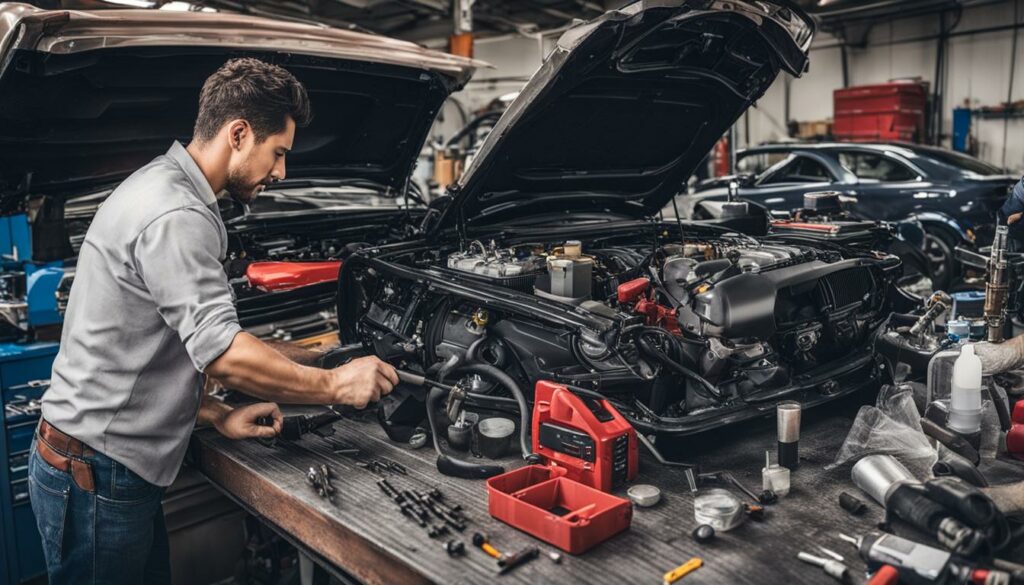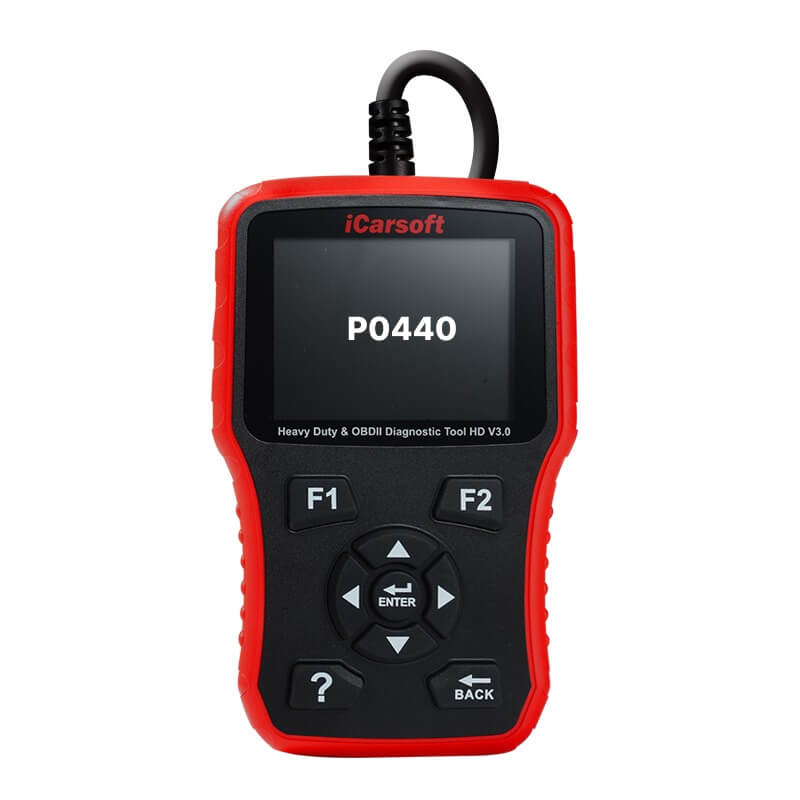P0440 – Evaporative Emission Control System Malfunction
POSTED IN pcodes
Encountering a P0440 code can be concerning, especially if you’re unfamiliar with its meaning and potential implications. In this article, we will explore the causes, severity, and possible fixes for the Evaporative Emission Control System Malfunction, commonly referred to as the P0440 code.
If you see the check engine light illuminated on your dashboard, accompanied by the P0440 code, it indicates a problem with your vehicle’s emission control system. The evap system, as it is commonly known, is responsible for collecting and storing fuel vapors to prevent them from escaping into the environment. Understanding the technical description and seriousness of this issue is crucial to address it effectively.
If you’re concerned about the complexity of diagnosing and repairing the P0440 code, fret not. While professional assistance is recommended for accurate diagnosis and repair, there is also an alternative solution available – the permanent removal of the specific Pcode by uploading the Engine Control Unit (ECU) file to a dedicated portal. However, it’s essential to note that this approach should be pursued cautiously, and professional guidance is always advised.
In the sections below, we will delve deeper into understanding the P0440 code, explore common causes, outline troubleshooting steps used by professional mechanics, discuss DIY solutions and repairs, and emphasize the importance of resolving this issue for the emission control system’s integrity and minimizing environmental impact.
Key Takeaways:
- The P0440 code indicates a malfunction in the vehicle’s Evaporative Emission Control System (evap system).
- Common causes of the P0440 code include a faulty gas cap, malfunctioning purge valve or vent valve, leaking charcoal canister, damaged EVAP hoses, or a defective fuel tank pressure sensor.
- Professional mechanics employ various troubleshooting steps, including gas cap inspection, code scanning, freeze frame data analysis, fuel system inspection, and smoke leakage tests to diagnose the issue.
- DIY solutions for the P0440 code include checking the gas cap, inspecting EVAP lines, purge valve, vent valve, charcoal filter, and using smoke machines for leak detection.
- Fixing the P0440 code is crucial to ensure emission control, minimize environmental impact, and maintain a clean and safe environment.
Understanding the P0440 Code
The P0440 code is a diagnostic trouble code that indicates a malfunction in the vehicle’s Evaporative Emission Control System, commonly referred to as the evap system. This system is responsible for collecting and storing fuel vapors that would otherwise be released into the environment.
Buy tested tuning file for Adblue / EGR / DPF / Adblue off now!
The P0440 code’s technical description reveals that there is a problem with the evap system’s operation. While the code itself does not have a specific meaning, it points to the need for further diagnosis to identify the exact issue within the system. It is important to note that the severity of the P0440 code is relatively low, as it does not typically affect the overall performance or drivability of the vehicle.
However, ignoring the P0440 code can lead to increased emissions and may result in a failed emissions test. Therefore, it is crucial to address the issue promptly to maintain both the vehicle’s efficiency and environmental compliance.
Some common symptoms associated with the P0440 code include:
- Check Engine Light: The illumination of the check engine light on the vehicle’s dashboard is often the first indicator of a problem.
- Fuel Vapor Odor: A noticeable smell of fuel vapors near the vehicle may suggest a leak or malfunction within the evap system.
- Poor Fuel Economy: A decrease in fuel efficiency can sometimes be attributed to an issue within the evap system.
It is important to address the P0440 code as soon as possible to prevent any further complications and ensure compliance with emissions regulations. In the following section, we will explore the common causes of the P0440 code and discuss troubleshooting steps for an accurate diagnosis and effective repairs.
Common Causes of P0440
The P0440 code can be triggered by various failures within the Evaporative Emission Control System. Common causes include:
- A faulty or loose gas cap
- Malfunctioning purge valve or vent valve
- Leaking charcoal canister
- Damage to EVAP hoses
- Defective fuel tank pressure sensor
When diagnosing the P0440 code, it is crucial to inspect each component thoroughly to identify the source of the fuel vapor leak. By determining the specific cause, you can take appropriate measures to address and resolve the issue effectively.

If you’re unsure of how to proceed or require professional assistance, it’s highly recommended to consult with an experienced mechanic who can provide accurate diagnosis and expert guidance for repairing the Evaporative Emission Control System.
Troubleshooting Steps for P0440
Diagnosing and resolving a P0440 code often requires the expertise of a professional mechanic. Here are the essential troubleshooting steps to identify and fix the issue:
- Inspect the gas cap: Begin by checking the gas cap for any visible damage or wear. A loose or faulty gas cap can trigger the P0440 code. Make sure the cap is properly tightened and in good condition.
- Scan codes in the ECM: Use an OBD-II scanner to retrieve the fault codes stored in the Engine Control Module (ECM). This helps identify the specific issue associated with the P0440 code.
- Evaluate freeze frame data: Analyze the freeze frame data captured by the ECM when the error occurred. It provides additional information about the vehicle’s operating conditions at the time of the fault, aiding in diagnosis.
- Conduct a fuel system inspection: A comprehensive inspection of the fuel system is crucial. Check fuel lines, vapor lines, and connections for any signs of damage, leakage, or blockage. Pay special attention to the fuel cap, ensuring it is securely fastened.
- Perform a smoke leakage test: To identify hidden vapor leaks, a smoke leakage test can be conducted. This test utilizes a smoke machine that introduces smoke into the system, revealing any areas where smoke escapes.
- Follow the manufacturer’s pinpoint test: Each vehicle manufacturer provides a specific diagnostic procedure, known as the pinpoint test. This test assists in a detailed inspection of the vapor sensor and the entire Evaporative Emission Control System.
If you’re not an experienced mechanic, it’s recommended to seek the assistance of a professional. They have the necessary tools and expertise to perform accurate diagnostics and repairs. Remember, proper diagnosis is essential to address the root cause of the P0440 code and ensure a successful resolution.
Now let’s take a look at an example of a diagnostic table summarizing the troubleshooting steps for the P0440 code:
| Troubleshooting Steps | Description |
|---|---|
| Inspect the gas cap | Check for damage or looseness |
| Scan codes in the ECM | Retrieve fault codes |
| Evaluate freeze frame data | Analyze vehicle operating conditions |
| Conduct a fuel system inspection | Check fuel and vapor lines |
| Perform a smoke leakage test | Detect hidden vapor leaks |
| Follow the manufacturer’s pinpoint test | Inspect vapor sensor and EVAP system |
DIY Solutions and Repairs for P0440
While professional assistance is recommended for diagnosing and repairing a P0440 code, there are some simple solutions that can be attempted.
- Checking for a loose gas cap: Begin by inspecting the gas cap to ensure it is tightly secured. A loose gas cap can trigger the P0440 code. If the cap is loose or damaged, replace it with an OEM cap for a proper seal.
- Inspecting EVAP lines, purge valve, vent valve, charcoal filter, and canister: Examine the rubber or plastic EVAP lines for cracks, leaks, or other damage. Inspect the purge valve and vent valve for proper operation. Check the charcoal filter and canister for any signs of contamination or blockage. Replace any faulty components as needed.
- Using a smoke machine for leak detection: A smoke machine is a valuable tool for identifying vapor leaks in the EVAP system. By introducing smoke into the system, you can visually detect any leaks and pinpoint their location for repair.
- AutoZone products: AutoZone offers a range of products that can assist with DIY repairs for the P0440 code. From gas caps and replacement EVAP components to smoke machines and leak detection tools, AutoZone has the necessary products to aid you in your diagnostic and repair process.
Remember, while these DIY solutions may resolve the P0440 code in some cases, it is important to consult a professional mechanic for a comprehensive diagnosis and proper repair.

The Importance of Fixing P0440
Fixing the P0440 code is crucial for various reasons.
Emission control: Resolving the P0440 code ensures that the vehicle’s Evaporative Emission Control System is functioning properly. This helps reduce harmful fuel vapor emissions, contributing to a cleaner environment.
Preventing environmental impact: Fuel vapor leaks caused by a malfunctioning EVAP system can result in increased pollution. By fixing the P0440 code, you help minimize the environmental impact and promote better air quality.
Health hazards: Fuel vapors can pose health hazards to both humans and animals. Resolving the P0440 code eliminates the risk of inhaling these harmful vapors, creating a safer environment for everyone.
By addressing and resolving the P0440 code, you not only ensure compliance with emission regulations but also make a positive impact on the environment and the well-being of those around you.
The Importance of Fixing P0440
Fixing a P0440 code is of utmost importance due to its significant impact on emission control and the environment. Ignoring or neglecting this issue can lead to severe consequences, including increased pollution and potential health hazards.
One of the primary reasons for fixing the P0440 code is to address fuel vapor leaks. When the Evaporative Emission Control System malfunctions, it can result in the release of fuel vapors into the atmosphere. These vapors contain harmful chemicals that contribute to air pollution and can have detrimental effects on both the environment and human health.
By repairing the evap system, you can effectively mitigate these fuel vapor leaks and reduce your vehicle’s environmental impact. This helps maintain emission control standards and supports efforts to create a cleaner and healthier environment for everyone.
Additionally, fixing the P0440 code is essential for your personal well-being. Fuels vapors can cause various health hazards when inhaled, leading to respiratory issues, allergies, and other serious health conditions. By promptly addressing and resolving the P0440 code, you help create a safe and healthy driving environment for yourself, your passengers, and others sharing the road.
It is crucial to emphasize that fixing the P0440 code is not only a responsibility but also a legal requirement. Compliance with emission regulations is mandatory, and failure to rectify the evap system malfunction can result in penalties and potentially lead to your vehicle failing an emissions test.
In conclusion, fixing the P0440 code is vital to protect the environment, mitigate fuel vapor leaks, and safeguard personal health. By addressing this issue promptly, you contribute to emission control efforts, reduce pollution, and ensure a safer and cleaner driving experience for everyone.
Conclusion
In conclusion, encountering a P0440 code can be a cause for concern. However, by following the appropriate troubleshooting steps and seeking professional assistance if necessary, it is possible to address the issue effectively. The Evaporative Emission Control System malfunction indicated by the P0440 code can lead to fuel vapor leaks, increased emissions, and potential environmental hazards.
While DIY solutions such as checking the gas cap and inspecting various components of the evap system can be attempted, it is important to note that seeking professional assistance from a mechanic is highly recommended. Professionals have the training, expertise, and diagnostic tools required to accurately identify the root cause of the P0440 code and undertake the necessary repairs.
By fixing the P0440 code and resolving the Evaporative Emission Control System malfunction, you can prevent fuel vapor leaks, ensure proper emission control, and reduce the overall environmental impact. Additionally, addressing the issue promptly helps maintain a cleaner and safer environment for everyone.
FAQ
What does the P0440 code mean?
The P0440 code indicates a malfunction in the vehicle’s Evaporative Emission Control System, which is responsible for collecting and storing fuel vapors to prevent them from escaping into the environment.
How severe is the P0440 code?
The P0440 code is relatively low in severity, as it does not typically affect the performance or drivability of the vehicle. However, ignoring the problem can lead to increased emissions and potential failure during an emissions test.
What are the common causes of the P0440 code?
Common causes of the P0440 code include a faulty or loose gas cap, malfunctioning purge valve or vent valve, leaking charcoal canister, damaged EVAP hoses, or a defective fuel tank pressure sensor.
What are the troubleshooting steps for the P0440 code?
Troubleshooting the P0440 code often requires the expertise of a professional mechanic. They may inspect the gas cap, scan codes in the ECM, evaluate freeze frame data, conduct a comprehensive fuel system inspection, and perform a smoke leakage test or follow the manufacturer’s pinpoint test.
Are there any DIY solutions or repairs for the P0440 code?
While professional assistance is recommended, some DIY solutions can be attempted for the P0440 code. These include checking for a loose gas cap, inspecting various components of the evap system such as EVAP lines, purge valve, vent valve, charcoal filter, and using a smoke machine for leak detection. AutoZone offers products that can assist with DIY repairs.
Why is it important to fix the P0440 code?
Fixing the P0440 code is important for several reasons. It helps maintain emission control, reduces environmental impact by preventing fuel vapor leaks, ensures compliance with emission regulations, and minimizes health hazards associated with leaking fuel vapors.


